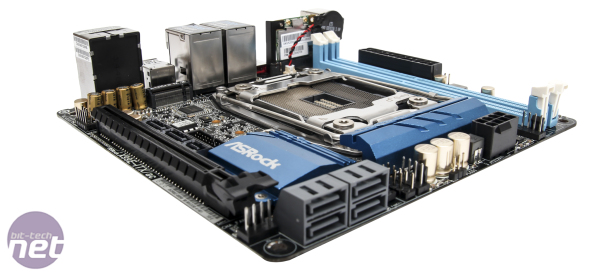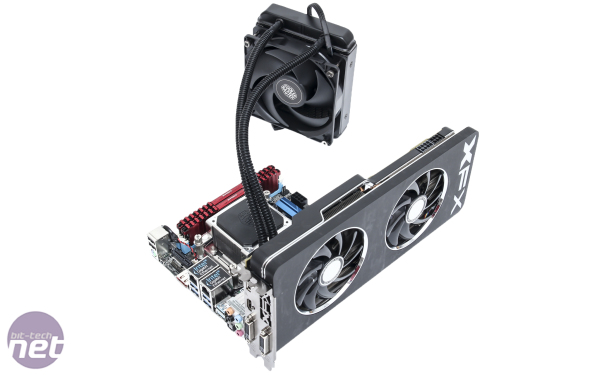
Performance Analysis
The all-important question with the X99E-ITX/ac is just how much performance are you losing compared to a larger X99 board? In overclocking terms, there's little disadvantage - we hit 4.3GHz quite easily and our CPU has only got a little higher, even with the best overclocking boards we've seen. In terms of raw speed, there's also very little if any discernable difference. It scored well in the video editing test and wasn't last by any means in the photo editing test too.Click to enlarge
Our rendering tests showed that at stock speed, it's not going to set the world alight but in each case there were slower examples. Once overclocked, the X99E-ITX/ac did rack up a couple of the slowest results we've seen, though, such as Cinebench R15 and photo editing, but again it was only a fraction off the pace. Of course, you gain in power consumption thanks to the small size of the PCB - it had the lowest stock speed results on test although this is likely to be as a result of using only one GPU - all the other boards were tested using two, albeit these results were obtained outside of any graphically demanding applications. Once overclocked, the result was pretty similar, although the extra CPU voltage required meant it leapfrogged a couple of boards, both at idle and load power consumptions.
Storage performance was excellent, though, with top marks both in SATA 6Gbps and M.2 and if you're worried about not being able to use a separate sound card, the X99E-ITX/ac proved to have some of the best onboard audio of any X99 board we've tested - almost identical to the good-performing Fatal1ty X99M Killer, except with a noticeably better THD.
Click to enlarge
Conclusion
Lets start with the negatives. The X99E-ITX/ac is an expensive motherboard. At £230, it's one of the pricier X99 boards we've tested. The Maximus VII Impact costs around £150, which is pricey, but not ridiculous for a Z97 motherboard, however the X99E-ITX/ac is arguably priced a little less aggressively. Then there are the issues with the motherboard itself. It only has one PCI-E slot, the custom CPU socket mount means you'll be very limited in CPU cooler choice and you're also lacking quad-channel memory support.
The CPU cooler issue is a slight sticking point but at least there are options. However, the rest of the issues won't likely bother you or should bother you if you're considering this motherboard as doing so means that you're already aware of the limitations of mini-ITX in general and those introduced by combining an LGA2011-v3 socket onto such a small PCB. Complaining about these shortcomings is akin to whining about the fact that if you ride a motorbike in the rain you'll get wet. They're designed to be small and light enough to offer super-car performance with tiny engines and have space for two people. Likewise, the X99E-ITX/ac is designed solely for people needing the same non-gaming grunt as a full-size X99 setup, but need that performance in a tiny system.
The fact you could combine the X99E-ITX/ac with a GTX 980 Ti or maybe the forthcoming AMD Fury Nano in a tiny case still makes for one of the best size: performance ratios in the PC gaming world and that's exactly what the X99E-ITX/ac is about. No you don't get multi-GPU or quad-channel memory support but that's totally beside the point. The only issue here is CPU cooler support. The included air cooler will be fine for stock speed CPUs, but anything more toasty and you'll need to turn to all-in-one liquid coolers or a modified water block, or you could use this optional mounting plate for EK's Supremecy waterblocks.
Which brings us back to the price. It is steep, but then the X99E-ITX/ac has the grand total of zero competitors. ASRock does make another mini-ITX motherboard in this category but it's purely server/workstation-focussed and not what most enthusiasts will be looking for. As a result it has a total monopoly, yet it still costs less than many other X99 motherboards. ASRock could quite easily have charged more, but as it stands it's only £80 more than a Maximus VII Impact. In many ways this review is kind of pointless - if you want a mini-ITX X99 board then you'll likely have bought or will be buying the X99E-ITX/ac anyway. Thankfully, it's actually a pretty good product in its own right and cements the fact that mini-ITX isn't just hear to stay but has micro-ATX very worried indeed.

-
Speed37 / 45
-
Features23 / 30
-
Value23 / 25


MSI MPG Velox 100R Chassis Review
October 14 2021 | 15:04










Want to comment? Please log in.